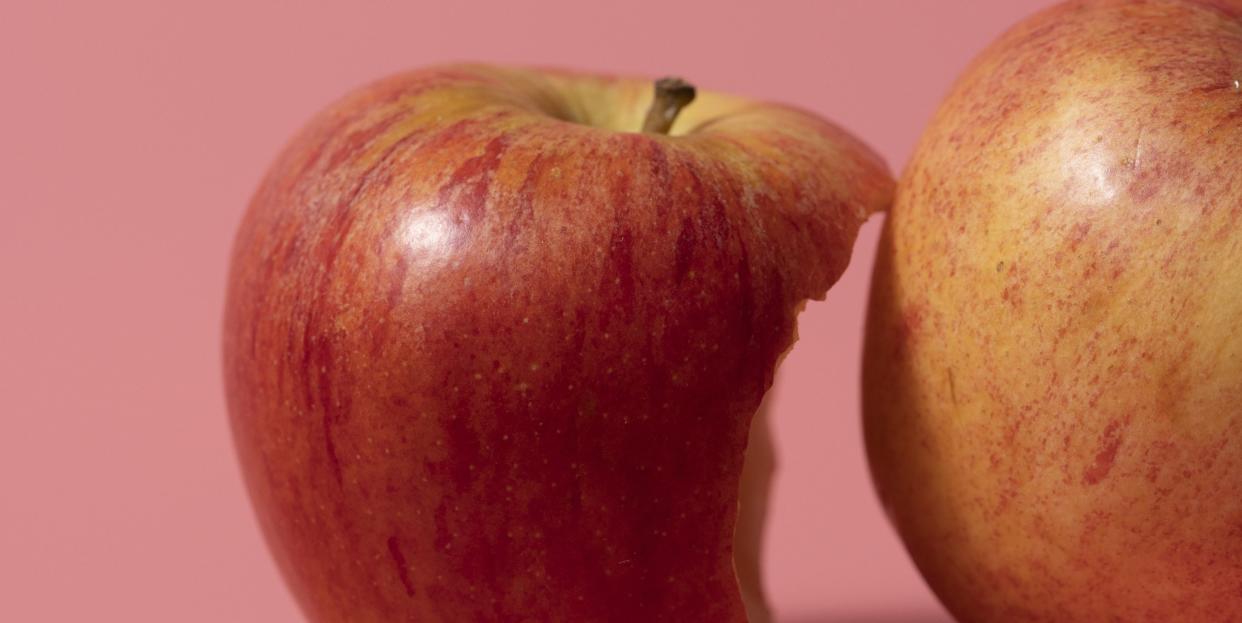The reason your mouth tingles when you eat certain foods

If you've ever bitten into a raw apple/cherry/almond (delete as appropriate) then suddenly felt a tingling, creeping itch spread across your inner mouth and lips, then you might have Oral Allergy Syndrome (also known as Pollen Food Syndrome). It's a condition that's particular common in hay fever sufferers. We asked Victoria Hamilton, a nutritional therapist with a focus of autoimmune nutrition, to explain exactly what it is, which foods can typically trigger a reaction, and how to treat that maddening itch.
What is Oral Allergy Syndrome (also called Pollen Food Syndrome)?
"Oral allergy syndrome is a condition which causes a person to react to food because they react to pollen from grass, trees or weeds, which is why it is also called ‘Pollen Food Syndrome’," explains Hamilton. "Your body reacts this way as the food has a similar protein structure or pattern as the pollen." As your body already reacts to pollen, the food has the same affect and many people experience sensations on their lips and tongue or in their throat, such as tingling and itching, after eating certain foods. "Many people with oral allergy syndrome, may also have seasonal hay fever due to the connection of these two conditions," she adds.
What causes Oral Allergy Syndrome?
Oral Allergy Syndrome is more likely to occur in people who already have imbalances in their immune system, notes Hamilton, as they have less tolerance to their surrounding environment. "This means their immune system is more reactive to things such as pollen, and when the food that they eat has a similar footprint to the pollen, their immune system goes into overdrive, and starts to assemble an inflammatory response." In most cases, this response leads to an allergic reaction to the food and can cause mild but uncomfortable symptoms. "The pollens which are most associated with this condition are birch, grasses and ragweed. As these plants are seasonable, people are more likely to have this response during seasonal changes."

What are the symptoms of Oral Allergy Syndrome?
"Symptoms are normally mild, localised and disappear quite quickly," says Hamilton. The main symptoms include redness, tingling, itching, scratchiness and swelling of the lips, tongue and throat. "It may also affect a person’s oesophagus and stomach causing pain and nausea, and a runny nose, sneezing and eye symptoms such as itching, puffiness and redness are also associated with the condition." Some people do experience more severe symptoms which is why it is important to consult with your GP if you suffer these types of reactions to food.
What foods cause Oral Allergy Syndrome?
Most commonly, raw fruits and raw vegetables cause the syndrome including:
Apple
Pear
Peach
Plum
Cherry
Nectarine
Apricot
Kiwi
Strawberry
Melons
Carrot
Celery
Potatoes
Tomatoes
Other plant based foods can also cause the condition, include raw legumes such as bean sprouts and mange tout. "Soy milk may also cause this reaction which can become fairly severe in some people," adds Hamilton.
The types of nuts that are usually associated with Oral Allergy Syndrome are as follows, but it's worth pointing out that Oral Allergy Syndrome should not be confused with a nut allergy, which is likely to be much more serious:
Hazelnuts
Almonds
Walnuts
Brazil nuts
Peanuts
How do you test for Oral Allergy Syndrome?
"Oral Allergy Syndrome is often suspected in people who are experiencing allergies to pollen and present with sensations in their lips, mouth or throat after eating foods associated with the syndrome," says Hamilton. A diagnosis of Oral Allergy Syndrome should be determined by your doctor, based on your presenting symptoms and history, but it can be confirmed by using a skin prick test as well.
"As this is a specialist area, some GPs may not be able to confirm the diagnoses so working with a clinic that specialises in allergies who are able to perform a skin prick and blood test will help to get a clearer picture of whether you are suffering from the condition," she adds. "However, these tests will not provide an indication of how severe your reaction to these foods will be – this will be for the allergist to determine and decide whether carrying an adrenaline is necessary to contain the reaction if severe."
What is the best way to treat Oral Allergy Syndrome?
Firstly, it's best to keep a food and symptoms journal, so that you can track which foods you are reacting to, advises Hamilton, adding that you should then remove these foods from your diet. "Also, as Oral Allergy Syndrome usually occurs with raw fruits and vegetables, it is best to cook these foods as the protein structures and patterns should change so your body will be less reactive to these foods. Freezing foods has also been shown to have similar effects."
Lastly, as the driving factor in the reaction is the immune system – it may be an indication that your immune system is currently out of balance and is being over stimulated by things that it shouldn't react to. To get the immune system back in to check, try to focus on eating a whole food diet with plenty of colourful vegetables, healthy fats and good quality protein. "You should also stay hydrated and eat foods to support your digestive system, such as high fibre foods, bone broth and fermented foods," recommends Hamilton. "As stress and lack of sleep can also disrupt the immune system, take steps to increase self-care in your life with stress management techniques and prioritising sleep."
Can Oral Allergy Syndrome be life-threatening or dangerous?
Oral Allergy Syndrome is usually mild, but in rare cases, it can affect beyond the mouth and throat, and cause breathing difficulties and problems with the cardiovascular system associated with anaphylaxis, says Hamilton. In this instance, using an adrenaline shot is needed to ensure that the symptoms do not become life threatening. This is why anyone who experiences Oral Allergy Syndrome should discuss it with their GP or allergist so that they are prepared for any eventuality.
Like this article? Sign up to our newsletter to get more articles like this delivered straight to your inbox.
You Might Also Like

